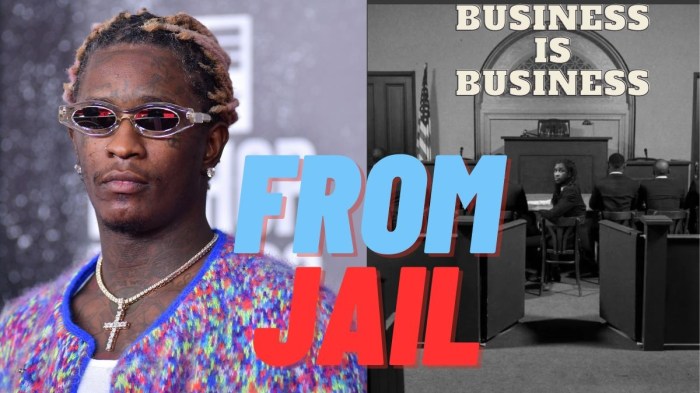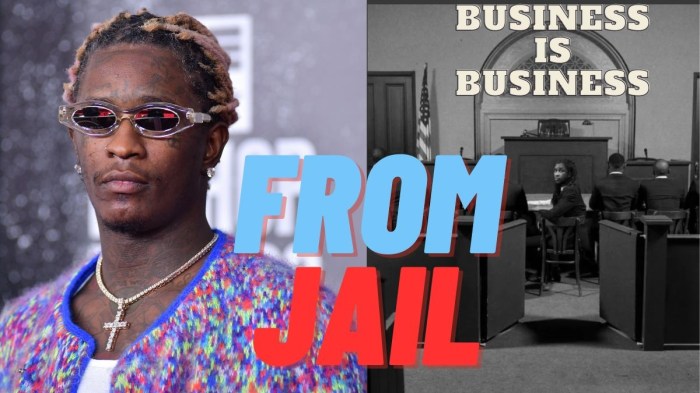Young Dolph Thinking Out Loud delves into the multifaceted artistry of the late rapper, exploring the nuances of his music, persona, and cultural impact. This deep dive analyzes the meaning behind “Thinking Out Loud” within his discography, examining lyrical themes, production styles, and the evolution of his persona.
This exploration meticulously examines Young Dolph’s musical style, tracing its evolution from early work to later projects, highlighting key influences and recurring motifs. It analyzes the social and cultural contexts reflected in his lyrics, contrasting his style with other prominent rappers. The analysis also unpacks the production techniques, the role of producers, and the evolution of the sound design across his career.
Young Dolph’s Musical Style & Influences

Young Dolph’s music transcended simple genre categorization, weaving together elements of trap, Southern hip-hop, and even hints of R&B. His unique sound, characterized by introspective lyrics and a raw, emotional delivery, resonated deeply with fans. His music wasn’t just about the beats; it was a reflection of his experiences, a testament to his resilience and ambition. His legacy is one of artistry, creativity, and deeply personal narratives.Dolph’s music often tackled themes of hardship, triumph, and the realities of life in his community.
Young Dolph’s introspective lyrics often reminded me of the calculated strategies in Counter Strike Dust 2. Just like a player meticulously planning their approach to a bombsite, Dolph’s thoughts were often deeply considered, meticulously laid out in his music. He wasn’t just rapping; he was thinking out loud, and the result was incredibly moving. Counter Strike Dust 2 is a phenomenal map, demanding tactical awareness, just like Dolph’s lyrics often demanded attention to detail.
This deep contemplation was the core of his genius.
His storytelling was authentic and relatable, drawing listeners into the world he inhabited. He didn’t shy away from complex issues, instead confronting them head-on with raw emotion and poetic precision. His lyrical prowess and ability to connect with his audience were key elements of his appeal.
Musical Style Description
Young Dolph’s music, while rooted in Southern hip-hop, exhibited a multifaceted approach. It encompassed a wide range of subgenres, often blending trap elements with soulful undertones and even hints of melodic R&B. His distinctive flow, combined with a powerful vocal delivery, created a sound that was instantly recognizable. He frequently incorporated elements of Southern rap, often incorporating rhythmic patterns and vocal styles common to the region.
The instrumentation, often featuring prominent basslines and heavy drum beats, supported the emotional weight of his lyrics.
Lyrical Themes & Storytelling
Dolph’s lyrics often delved into the realities of urban life. He explored themes of hardship, triumph, and the complexities of relationships with raw honesty. His personal experiences, both positive and negative, fueled his storytelling, creating a narrative that resonated deeply with his audience. He frequently touched on themes of perseverance, resilience, and the challenges faced by those in his community.
He often portrayed the struggles and triumphs of everyday life, from financial hardships to personal relationships.
Influences & Recurring Motifs
Several artists and musical movements likely influenced Young Dolph’s style. His early exposure to Southern hip-hop artists, combined with the rise of trap music, undoubtedly shaped his sound. The emotional intensity of certain R&B artists might have also contributed to his distinctive vocal delivery and lyrical depth. The social and cultural landscape of his upbringing in Memphis, Tennessee, undoubtedly served as a crucial influence on his storytelling and lyrical themes.Recurring musical motifs and stylistic elements frequently appeared across his discography.
The consistent use of specific instrumental elements, like prominent basslines and heavy drum patterns, created a signature sound. A particular emphasis on emotionally charged delivery and lyrical content, often addressing personal struggles and triumphs, added depth and authenticity to his work.
Evolution of Musical Style
| Period | Early Work | Later Projects |
|---|---|---|
| 2010-2015 | Early mixtapes and projects often focused on street-level experiences, reflecting the social and economic conditions of his surroundings. More aggressive delivery, simpler instrumentation, and a focus on direct lyrical content. | Later projects showcased more intricate production techniques, a wider range of lyrical topics, and a more polished sound. Dolph’s delivery evolved from an aggressive, rapid-fire style to one that encompassed more nuance and emotional depth. An expansion of lyrical themes and incorporation of melodic elements were also evident. |
The table above illustrates a progression in Young Dolph’s musical style. His early work laid the foundation for his unique sound, while his later projects refined and expanded upon those initial elements. The development is evident in the evolution of his production techniques, lyrical content, and overall delivery.
Lyrical Content & Themes
Young Dolph’s music transcends a simple portrayal of street life. His lyrics delve into complex emotional landscapes, offering a glimpse into the realities and struggles faced by many within the communities he represented. He wasn’t just rapping about the hustle; he was sharing a story, often a painful one, with raw honesty. This authenticity resonated deeply with listeners, connecting them to the experiences he depicted.Beyond the surface-level narratives, Dolph’s music often acts as a social commentary.
His lyrics reflect the cultural context of his upbringing, the pressures of poverty, and the pervasive struggle for survival in certain communities. This reflection on social realities makes his music both poignant and powerful.
Prevalent Themes & Subject Matter
Young Dolph’s lyrics are characterized by a potent blend of themes. He frequently explored themes of wealth, poverty, and the struggles of maintaining a successful life while navigating difficult circumstances. This is often interwoven with reflections on family, loyalty, and the weight of responsibility. Grief and loss are also prevalent, with songs often touching on the pain of losing loved ones and the impact of violence.
Social & Cultural Contexts
Young Dolph’s music provides a unique lens through which to examine the social and cultural contexts of the communities he represented. His lyrics reveal the realities of poverty, systemic inequality, and the pressure to succeed in environments with limited opportunities. The themes of violence and crime are frequently intertwined with these realities, showcasing the challenges and pressures faced within these communities.
Comparison with Other Rappers
Compared to other prominent rappers, Young Dolph’s lyrical style often stands out in its raw honesty and vulnerability. While many rappers focus on showcasing wealth and bravado, Dolph’s lyrics often delve into the emotional complexities of his experiences. His focus on family and the weight of responsibility differs from the braggadocio prevalent in some contemporary rap. He often depicted the struggles of maintaining a successful life in the face of adversity.
Key Lyrical Concepts & Examples
- The Hustle & Survival: This theme emphasizes the relentless pursuit of success and survival in challenging circumstances. Examples include songs where he reflects on the struggle for wealth and the necessity of hard work. A strong example of this is his dedication to his community and supporting those around him. This demonstrates how the pursuit of wealth and success can sometimes take precedence over personal relationships.
- Family & Loyalty: Dolph often expressed profound love and loyalty towards his family and close friends. Songs highlighting these themes demonstrate his deep-seated emotional connections. These connections show how loyalty is important, even when faced with tough situations.
- Loss & Grief: The impact of loss and grief on his life is frequently explored in his music. Songs about loved ones lost showcase his vulnerability and the profound pain of these experiences.
Lyrical Themes Across Albums/Mixtapes
| Album/Mixtape | Predominant Themes |
|---|---|
| Rich Slave | Ambition, wealth, and the pursuit of success in challenging circumstances. |
| King of Memphis | Reflection on his rise to prominence and the responsibilities that come with it. Also showcases loyalty to the community. |
| Bulletproof | Loss, grief, and the aftermath of violence. Also reflects on the struggles and realities of the communities he represented. |
Dolph’s Persona & Storytelling
Young Dolph’s music isn’t just about rapping; it’s a deeply personal narrative woven from his experiences, observations, and the realities of his environment. He crafts a distinct persona that evolves over time, reflecting his growth, struggles, and the ever-changing landscape around him. His storytelling isn’t simply about events; it’s about the emotional weight and societal implications behind those experiences.His lyrics are often raw and unflinching, offering a glimpse into the complexities of life in the streets and the constant pressure of survival.
This raw honesty, coupled with his evolving persona, resonated deeply with his audience, connecting on a level that transcended mere entertainment.
Evolving Persona
Young Dolph’s persona is not static; it transforms alongside his life experiences. Initially, he portrayed a persona often associated with the “street” or “gangster” archetype, but his lyrics and persona evolved to include elements of resilience, family loyalty, and the desire for a better future. This shift is a reflection of his journey, a progression that often reflects a growing awareness of his responsibilities and aspirations.
Young Dolph, always one to ponder big ideas, seems to have been mulling over something new. Maybe he’s thinking about the intricacies of a fish hatchery – something like Start a Fish Hatchery could be a fascinating project for someone with his entrepreneurial spirit. Regardless, it’s clear he’s got a lot on his mind, and his deep thinking is something we should all appreciate.
Personal Experiences in Lyrics
Young Dolph’s music is deeply rooted in his personal experiences. He vividly depicts the challenges of poverty, the pressures of a difficult upbringing, and the importance of family bonds. He uses these themes to illustrate the circumstances and struggles many face in similar contexts. This authenticity creates a strong emotional connection with listeners who can relate to the hardships depicted in his lyrics.
His music is not just about telling a story; it’s about sharing a lived experience.
Recurring Narratives
Several recurring themes and narratives run through Young Dolph’s music. The struggles of navigating the streets and the dangers of violence are prominent, often contrasted with the need for family and the desire for a better life. The tension between these realities is a common motif. Another recurring narrative is the complex relationship between ambition and the obstacles faced in achieving it.
Young Dolph’s introspective lyrics often feel like him thinking out loud, pouring his soul onto the page. Learning how to add interactive elements like buttons to a website, like you can find out more about at Insert Buttons in an HTML Website , can be a similar process – carefully crafting each element to achieve a specific effect.
It’s all about expressing yourself, whether it’s through music or code. This thoughtful approach resonates deeply in both areas.
Relationship to Hip Hop Culture
Young Dolph’s persona and storytelling are intrinsically linked to the context of hip-hop culture. He embodies the resilience and perseverance of many artists who rose from challenging backgrounds. His narrative reflects the struggles and triumphs of the marginalized communities often represented in hip-hop. His music often commented on the realities of the music industry, the pressures of fame, and the expectations placed upon artists.
Key Character Traits & Archetypes
| Character Trait | Archetype | Explanation |
|---|---|---|
| Resilience | Underdog | Despite facing significant challenges, Dolph persevered and found ways to succeed in his chosen path. |
| Family Loyalty | Guardian | His lyrics often highlight the importance of family bonds, showcasing his commitment to protecting and supporting his loved ones. |
| Ambition | Achiever | His music reflects a strong desire for success and a willingness to overcome obstacles to achieve his goals. |
| Street Smarts | Survivor | His music conveys a profound understanding of the realities of life on the streets, showcasing his ability to navigate complex situations. |
| Vigilance | Defender | His music often depicts the need for vigilance in dangerous environments, demonstrating a sense of protection and awareness. |
Impact & Legacy: Young Dolph Thinking Out Loud

Young Dolph’s untimely passing left a void in the hip-hop community, but his music continues to resonate with listeners and influence subsequent artists. His unique blend of storytelling, Southern rap sensibilities, and a raw vulnerability created a distinct voice that transcended trends. This impact extends beyond his immediate circle of fans, leaving a lasting mark on the genre and its evolution.His music, often characterized by its gritty realism and emotional depth, has become a touchstone for many, particularly those from similar backgrounds or who share his struggles and aspirations.
The impact of his work is palpable, evident in the ongoing conversations about his artistry and the enduring influence he has had.
Cultural Impact on Listeners and Hip-Hop Community
Young Dolph’s music resonated deeply with a specific demographic, creating a powerful sense of connection. His relatable lyrics about street life, ambition, and personal struggles resonated with listeners who experienced similar circumstances. This connection created a sense of community and shared experience, further solidifying his cultural impact. His music often explored the complexities of urban life, giving voice to the stories often unheard or misrepresented in mainstream media.
Influence on Subsequent Artists
Young Dolph’s influence on subsequent artists is multifaceted. His distinctive flow, lyrical style, and storytelling techniques have been noted by many aspiring rappers. The emotional depth and authenticity in his music served as an inspiration for artists looking to create music that connects with their audiences on a deeper level. Many artists, particularly from the Southern hip-hop scene, cite him as a major influence.
Resonance with Audiences Today, Young dolph thinking out loud
Young Dolph’s music continues to find a new generation of listeners, particularly those seeking raw, authentic storytelling. His lyrics often transcend specific trends, resonating with those who appreciate the honest depiction of life experiences. The music’s enduring popularity highlights its ability to connect with a broader audience beyond its initial fanbase.
Examples of Inspired Artists
Several artists have acknowledged Young Dolph’s influence. His unique blend of lyricism and storytelling has been recognized by emerging artists seeking to create a distinct voice within the genre. While specific names and details may vary, the impact is clear in the musical landscape.
Impact on Hip Hop Genre Over Time
| Year | Musical Element | Young Dolph’s Impact |
|---|---|---|
| 2010s | Gritty Southern Rap | Dolph’s music popularized a unique, raw style of storytelling within Southern hip-hop, impacting the evolution of the genre. |
| 2010s-2020s | Emotional Storytelling | His willingness to express personal struggles and triumphs influenced a shift toward more emotionally charged and relatable lyrics. |
| 2020s | Continued Relevance | Young Dolph’s music continues to resonate with new listeners, demonstrating its lasting impact on the genre’s evolution and popularity. |
Thinking Out Loud Analysis
Young Dolph’s music, often characterized by its raw emotion and unflinching honesty, offers a profound look into the human condition. “Thinking Out Loud,” a recurring theme in his work, reveals the internal struggles and reflections that shaped his artistic vision. This analysis delves into the phrase’s meaning within his music, exploring its possible inspirations, and highlighting its significance in his artistic evolution.The phrase “Thinking Out Loud” within Young Dolph’s music signifies a deep contemplation of life’s complexities.
It embodies a journey of self-reflection, grappling with personal experiences, and the realities of his world. It’s not just about thinking, but about the process of evaluating those thoughts, understanding their impact, and making decisions based on that understanding. This resonates deeply with his audience, who connect with the vulnerability and honesty expressed in these moments of introspection.
Possible Influences and Inspirations
Young Dolph’s upbringing and experiences undoubtedly shaped his perspective on life and the struggles he faced. The pursuit of success in a challenging environment, coupled with the need for self-preservation, likely played a significant role in his frequent reflections on the choices he made. Hip-hop’s rich tradition of introspection, particularly the introspection found in the works of other artists, provided a framework for his own personal expression.
The influence of artists who explored similar themes, like those who discussed hardship and ambition, also played a crucial part in developing this core theme in his work.
Significance in Artistic Development
The recurring use of “Thinking Out Loud” in Young Dolph’s music demonstrates a conscious evolution in his artistic development. It signifies a movement from simple narrative storytelling to a more nuanced exploration of the internal landscape. This deeper level of self-awareness and reflection provided a platform for a more mature and emotionally resonant artistic voice. This evolution allowed him to create music that resonated with a wider audience.
His ability to convey such raw, personal struggles through his music is a significant element in his artistic development.
Relation to Overall Themes
“Thinking Out Loud” is intricately connected to the overarching themes of hardship, ambition, and the pursuit of success. His lyrics often depict the realities of street life, highlighting the pressures and temptations that come with that environment. The phrase underscores the internal battles he faced, the decisions he made, and the consequences he experienced. This often intertwined with the themes of self-preservation, showcasing how his reflections on those challenges and decisions impacted his approach to life and music.
Appearance in Lyrics
The phrase “Thinking Out Loud” isn’t always used literally in his songs. Instead, it’s reflected in the lyrics through moments of introspection, contemplation, and acknowledgment of past mistakes or difficult choices. For example, in a song about overcoming adversity, the lyrics might describe the mental process of evaluating past actions, leading to decisions about the future. Another example would be the recurring contemplation of choices and their implications, providing a deep emotional core to the songs.
These lyrics, though not explicitly using the phrase, often depict the core concept of introspection. Another example might be a song about a missed opportunity, where the lyrics reveal the singer’s internal struggle and reflection on the “what ifs”.
Summary
Ultimately, Young Dolph Thinking Out Loud reveals a complex and compelling artist whose music transcended mere lyrics, becoming a powerful reflection of his experiences and observations. The analysis of “Thinking Out Loud” provides a deeper understanding of his creative process and the lasting impact of his artistry. This comprehensive look unveils the richness and depth of his work, making a lasting impression on the listener.




